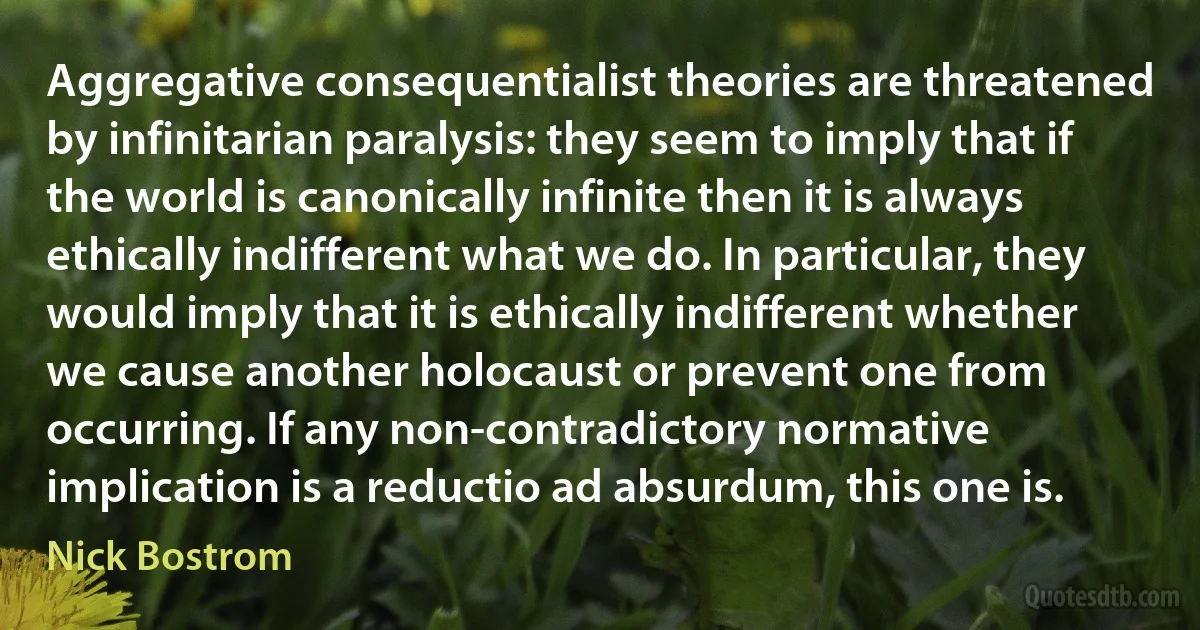Normative Quotes
Confronted with such a variety most philosophers try to establish one approach to the exclusion of all others. As far as they are concerned there can only be one true way- and they want to find it. Thus normative philosophers argue that knowledge is a result of the application of certain rules, they propose rules which in their opinion constitute knowledge and reject what clashes with them.

Paul Karl Feyerabend
Perceptual space is not a special space in addition to physical space, but physical space which we endow with a special subjective metric. ...apart from the definition of congruence in physics and that based on perception, there is no third one derived from pure visualization. Any such third definition is nothing but the definition of physical congruence to which our normative function has adjusted the subjective experience of congruence.

Hans Reichenbach
There is no pure visualization in the sense of a priori philosophies; every visualization is determined by previous sense perceptions, and any separation into perceptual space and space of visualization is not permissible, since the specifically visual elements of the imagination are derived from perceptual space. What led to the mistaken conception of pure visualization was rather an improper interpretation of the normative function... an essential element of all visual representations. Indeed, all arguments which have been introduced for the distinction of perceptual space and space of visualization are base on this normative component of the imagination.

Hans Reichenbach
Naturally, since I am not concerned with normative allegations, I cannot be concerned here with the invocation of the overtone series as a 'natural' phenomenon, and that application of equivocation which then would label as 'un-natural' (in the sense, it would appear, of morally perverse) music which is not 'founded' on it. Now, what music, in what sense, ever had been founded on it?

Milton Babbitt
We are in the society of the teacher-judge, the doctor-judge, the educator-judge, the 'social-worker'-judge; it is on them that the universal reign of the normative is based; and each individual, wherever he may find himself, subjects to it his body, his gestures, his behavior, his aptitudes, his achievements.

Michel Foucault
The classical legacies of political thought, from Plato to Nietzsche, and the immediate tasks of running the world, at home and abroad, have been of most concern to the Right. Normative philosophical constructions have become a specialty of the Centre. Economic, social and cultural investigations – of past and present – dominate the output of the Left. Any attempt to come to grips with all three outlooks is thus obliged to traverse quite variegated ground.

Perry Anderson
Even a single missed crucial consideration could vitiate our most valiant efforts or render them as actively harmful as those of a soldier who is fighting on the wrong side. The search for crucial considerations (which must explore normative as well as descriptive issues) will often require crisscrossing the boundaries between different academic disciplines and other fields of knowledge. As there is no established methodology for how to go about this kind of research, difficult original thinking is necessary.

Nick Bostrom
I never believed, as many Marxists professed to do, that normative principles were irrelevant to the socialist movement, that, since the movement was of oppressed people fighting for their own liberation, there was no room or need for specifically moral inspiration in it. I thought no such thing partly for the plain reason that I observed enormous selfless dedication among the active communists who surrounded me in my childhood, and partly for the more sophisticated reason that the self-interest of any oppressed producer would tell him to stay at home, rather than to risk his neck in a revolution whose success or failure would be anyhow unaffected by his participation in it. Revolutionary workers and, a fortiori, bourgeois fellow-travellers without a particular material interest in socialism, must perforce be morally inspired.

Gerald Cohen
Christianity has functioned for the normative self-understanding of modernity as more than a mere precursor or a catalyst. Egalitarian universalism, from which sprang the ideas of freedom and social solidarity, of an antonomous conduct of life and emancipation, of the individual morality of conscience, human rights, and democracy, is the direct heir to the judaic ethic of justice and the Christian ethic of love. This legacy, substantially unchanged, has been the object of continual critical appropriation and reinterpretation. To this day, there is no alternative to it. And in the light of the current challenges of a postnational constellation, we continue to draw on the substance of this heritage. Everything else is just idle postmodern talk.

Jürgen Habermas
The natural philosophy of the new developments in the sciences is a systems philosophy. When properly articulated, it can give us both factual and normative knowledge. Exploring such knowledge and applying it in determining our future is an opportunity we cannot afford to miss. For if we do not, another chapter of terrestrial evolution will come to an end, and its unique experiment with rational consciousness will be written off as a failure.

Ervin László
Whenever men began to talk about too many people, they are paving the way for their destruction. It represents a suicidal element in man. For children are the aspects of man's dominion. Moreover another aspect of that dominion is dominion over every living thing. Over the animal world. Man is thus created with a relationship towards animals established as normative with healthy psychology.

Rousas John Rushdoony
A culture fixated on female thinness is not an obsession about female beauty, but an obsession about female obedience. Women's dieting has become what Yale psychologist Judith Rodin calls a 'normative obsession,' a never-ending passion play given international coverage out of all proportion to the health risks associated with obesity, and using emotive language that does not figure even in discussions of alcohol or tobacco abuse. [...] Dieting is the most potent political sedative in women's history; a quietly mad population is a tractable one.

Naomi Wolf
Throughout the nineteenth century, apart from the division in theoretical sciences and arts, classifiers attempted to divide the sciences into two groups. Already they had before them the examples of Francis Bacon (speculative and descriptive) and Hobbes (quantitative and qualitative). For Coleridge, the sciences were either pure (Grammar, Logic, Rhetoric, Mathematics, Metaphysics) or mixed. Arthur Schopenhauer's similar groups were called pure and empirical, Wilhelm Wundt in 1887 called them formal and empirical, Globot mathematical and theoretical, and the St. Louis Congress of Arts and Sciences (1904) normative and physical.

Brian Campbell Vickery
[T]wo moments, of trance and struggle, mingle in the real life of societyː an undercurrent of conflict and disbelief always counteracts the routines of dependence and deference. Society, no matter how impregnable it seems to its inhabitants, always stands at the edge of the cliff. The petty practical quarrels and normative disputes, endlessly refought to reproduce a social world in the face of divergent interests and changing circumstance, can escalate at any moment into broader and more intense conflicts that put this world at risk.

Roberto Mangabeira Unger
We now live in what the German political scientist Ernst Fränkl called the dual state. Totalitarian states are always dual states. ... The outward forms of democracy, of democratic participation, voting, competing political parties, judicial oversight and legislation remain, but are hollow political stagecraft. And Fränkl called those who wield this unchecked power over the citizenry "the prerogative state.” The masses in a totalitarian structure live in what he termed "the normative state.”.

Chris Hedges
The Afghan jihad confronted the theoreticians of democratic Islam with a hard reality. The Red Army was not defeated by a democratic revolution, but by an Islamist revolution grounded, guided, and steeled by God's words as found in the Koran and explained by the Prophet. Driven by their faith, the mujhadein [sic] uses bullets, not votes, to win one for Allah, and by so doing revalidated jihad as Islam's normative response to attack.

Michael Scheuer



